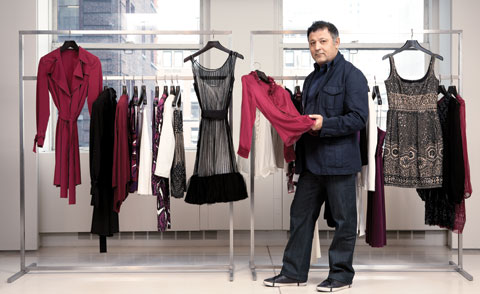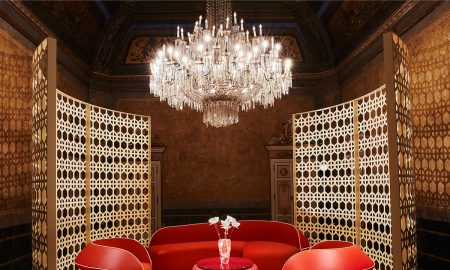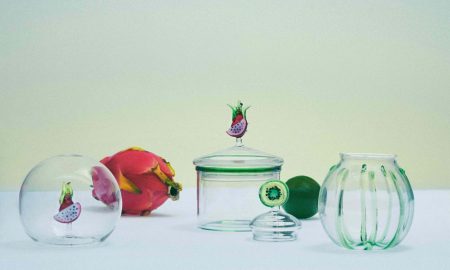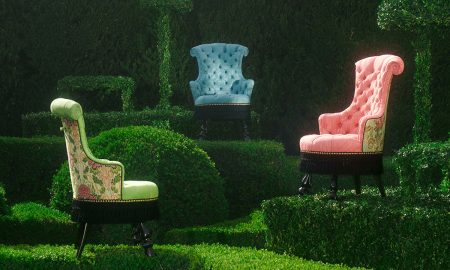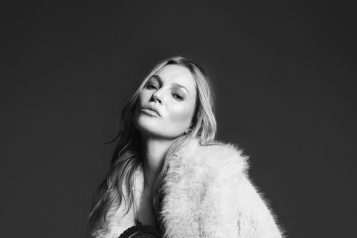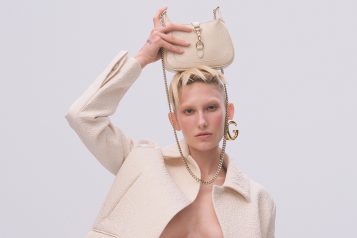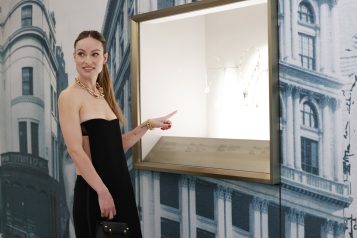Elie Tahari’s path-from Jerusalem to Bryant Park-winds through a maze of dreams and instinct in pursuit of life’s ultimate goals: love, self-discovery, and paramount success.
By Eve Gurevich
Photography by Bob Martus
“I became a designer by accident,” says Tahari, whose humility surrounds his success.
The paradox of self-assured wisdom and a child-like tendency for mischief mark the canvas of Elie Tahari’s face as he examines one of his latest designs. The bright feminine blouse adds a vividly contrasting effect to the backdrop of Tahari’s wardrobe of midnight hues. His wardrobe choice for our interview is a loose fitting jacket over a tailored shirt with subtle piping, dark slacks, and tennis shoes-all in variations of navy. Each article of clothing is casual and unpretentious…in a word: simple.
Tahari, chairman of the eponymous label, likes to keep things simple; in fact, simplicity commands his designs, his décor, and his fundamental philosophy on life’s ups and downs. Fortunately, the downs are usurped by the success of his lucrative Elie Tahari brand, which can be found in virtually every woman’s closet-and the men are quickly catching on, following the launch of the men’s collection in 2006. New markets, new stores, and new product categories are propelling Elie Tahari’s global presence, expanding the empire that he began in 1971.
Jerusalem-born Elie Tahari spent his formative years in Tel Aviv attending a boy’s school and like most teenaged Israelis, Tahari enrolled in military school, but by the time he was 20, he wanted to escape the parochial upbringing of an all-male existence. Naturally, New York was Tahari’s destination of choice. In 1971, with just $60 in his pocket and not a single relative nor acquaintance, Tahari arrived in Manhattan’s East Village. “In a way, I was lucky that I did not know anyone because it forced me to really plug into the vibe of New York,” he explains. Tahari’s stint as an electrician in the garment district presented an opportunity to moonlight as a sales clerk in a Greenwich Village boutique. Showroom hopping by day and selling clothing by night gave Tahari a crash course in fashion and fashionable women.
“I became a designer by accident,” says Tahari, whose humility surrounds his success. Tahari’s humble assessment masks his innate business acumen-apparent from the earliest stage of his career. Tahari’s grasp of supply and demand gave his first employer the opportunity to learn from the apprentice. Tahari would inform his boss about which items sold best, who was buying them, and how the shop could generate higher profits. The women’s movement of the ’70s was, oddly enough, the catalyst for Tahari’s success. Gloria Steinem’s burning bra gave rise to Tahari’s first cash cow, the tube top. It quickly became the staple for the sundry generation basking in sex, drugs, and rock ‘n’ roll. Ready for his own venture, Tahari began producing one tube top at a time, which he would duplicate only after the previous one had sold.
Today Elie Tahari Ltd. is a privately held company and Tahari remains in control of all aspects of the brand. Tahari strongly believes that his company’s success is largely due to its flexibility, or as Tahari puts it, “to swing with the fashion winds…we are maneuverable, like a sail boat.” The chairman also credits the company’s steady growth to the product’s high quality craftsmanship, attention to detail, and its affordable price. Susan Kellogg, CEO, shares Tahari’s mantra for the company’s success: “The product comes first.”
So while an economic recession finds many showrooms with a stack of canceled orders, Elie Tahari buyers remain optimistic. “Spring is up 20 percent from last year,” explains Kellogg. “Elie Tahari is a top seller for many of our accounts, so I feel that stores and consumers are positive despite the current economic downturns.” Elie Tahari’s global appeal allows women from New York to Istanbul to buy similar items. “When you make clothes that hit the fashion spot, the buyer is similar everywhere,” explains Tahari.
Elie Tahari’s vice chairman is his wife of 10 years, Rory. “She completes me,” laughs Tahari. The mischief in his face comes out as he brings a pinky to his lip, but it is quickly replaced by a peaceful expression of a man in love and at ease with his surroundings. “She was beautiful, I felt good energy,” says Tahari of their first meeting. “Usually I couldn’t even spend five-minutes with a woman…but when it’s right, you know it’s right.”
On the night they met, Tahari convinced Rory to take a picture with him and when she asked why he wanted a picture with a stranger, he calmly explained that she would one day be his wife. And one year later, she was. “She’s extremely kind, generous, and immaculately organized. What I didn’t know was how good she was in business, which is a bonus.” Bonus indeed.
One of the many contributions Rory has made to Elie Tahari is the spring advertising campaign, shot by world-renowned photographer/provocateur Terry Richardson. “The brand is about feeling sexy in a sophisticated modern way. Elie Tahari lets women be playful,” explains Rory. The playfulness is captured in the advertising motif of elegantly dressed free spirits. “The campaign received amazing feedback,” says Rory, “I want women to see the picture and say, ‘I want to be her, I want to feel what she feels.'”
Rory’s aesthetic convictions are embodied each season with a classic, modern collection thanks to her part-time job as a muse to her husband. Make that her second part-time job, which follows her role as mother to the couple’s two adorable children, three-year-old Zoe and Jeremey, who is six. The family lives near the Soho store, and spends summers in the Zen-like serenity of their Sagaponack home. Up the road from their modern Hamptons estate is one of the newest and largest Elie Tahari boutiques, designed by Piero Lissoni, who has collaborated with the Taharis on both personal and professional endeavors. Fitting with the Taharis’ unorthodox trajectory, the couple found Lissoni while they were lost in Venice. A hotel designed by Lissoni greeted the Taharis as they turned into a dark alleyway. The rest, as they say, is history.
The new Elie Tahari boutiques in East Hampton and Boca Raton display Lissoni’s fluidity in design, showcasing classic, clean lines in the spirit of Elie Tahari apparel. “The Elie Tahari Company is one of many that continues to make significant investments in the East Hampton commercial district,” says Margaret Turner, the executive director of East Hampton’s Business Alliance. “In particular, Mr. Tahari and his architects and builders have created a stylish and elegant retail showcase for his products at One Main Street, the epicenter of East Hampton shopping. He knows that his customers are here.”
Elie Tahari’s European headquarters in Milan and a soon-to-open flagship store in Istanbul multiply the brand’s exposure. “Right now we are looking to expand in markets including the Middle East, Russia, and Asia,” says Tahari. Moscow’s leading department store Tsum, and London’s retail emporiums, Selfridges and Harvey Nichols, also have Elie Tahari shops. “This is quite tremendous for us,” says Kellogg. “I feel that it is important that we continue to grow on an international level in order to bring the Elie Tahari lifestyle to customers around the globe.” Elie Tahari’s presence in department stores such as Saks Fifth Avenue, Bergdorf Goodman, and Neiman Marcus strengthen the brand’s national appeal to a demographic seeking both style and luxury.
The future of Elie Tahari includes the possibility of expanded lifestyle stores, which will offer everything from clothing and home accessories to cosmetics and fragrance. Following a successful foray into women’s accessories, a men’s accessories line will launch this fall. More stores are in development, and a new crop will soon burgeon in Europe and Asia. “Real estate opportunities and options are developed with our partners,” explains Tahari, who has collaborated with such prestigious companies as Unitim Holding and SK Networks, a remarkable feat for a man that began with only $60 of start-up capital. “To have wealth and love, you’ve got to work on it,” concludes Tahari, as he leans back and smiles. “But love especially, because you can’t win it or own it, but it’s the most important thing in life.”







